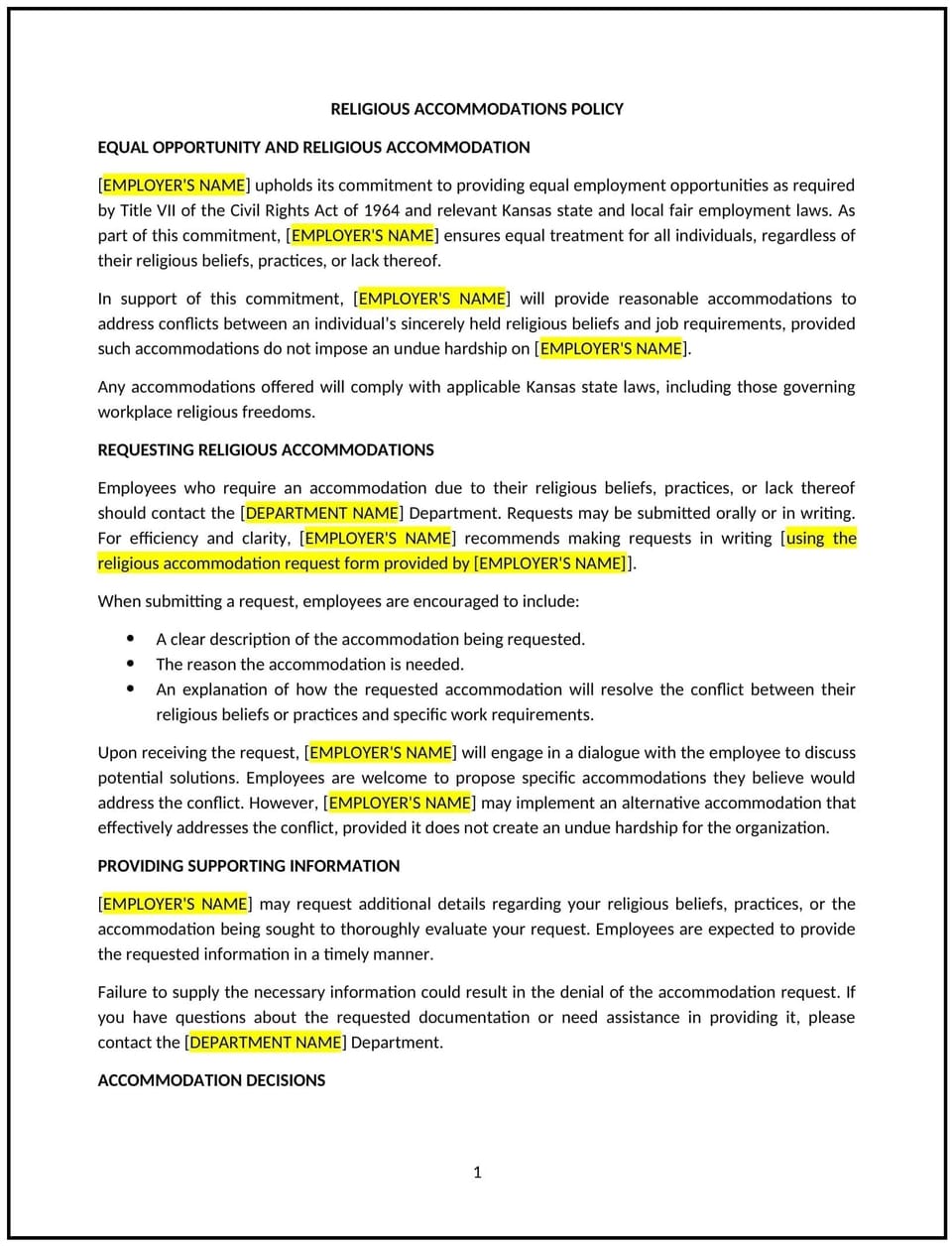Religious accommodations policy (Kansas): Free template

Religious accommodations policy (Kansas)
A religious accommodations policy helps Kansas businesses provide reasonable accommodations for employees’ religious beliefs and practices. This policy outlines how the company will handle requests for time off for religious observances, dress code accommodations, and any other religious needs while ensuring fairness and minimizing disruptions to business operations.
By implementing this policy, businesses can foster an inclusive workplace where employees’ religious rights are respected and supported.
How to use this religious accommodations policy (Kansas)
- Define religious accommodations: Businesses should specify what types of accommodations may be requested, such as flexible work schedules, time off for religious holidays, or modifications to dress codes or grooming requirements.
- Set request procedures: The policy should establish a clear process for employees to request religious accommodations, including who to contact, what information is needed, and how far in advance requests should be submitted.
- Evaluate accommodation requests: Businesses should review accommodation requests on a case-by-case basis, considering the nature of the request, the employee's needs, and the impact on business operations.
- Determine the feasibility of accommodations: The policy should outline how businesses will assess whether an accommodation can be provided without causing undue hardship to the company, such as significant disruption to operations or excessive costs.
- Provide alternative solutions: If the requested accommodation is not feasible, businesses should explore alternative solutions that allow employees to practice their religion while balancing the company’s needs.
- Protect employee confidentiality: Businesses should maintain the confidentiality of employees' religious practices and requests, ensuring that this information is not disclosed unnecessarily.
- Review and update regularly: Businesses should periodically review the policy to ensure it remains in line with legal requirements, industry practices, and employee needs.
Benefits of using a religious accommodations policy (Kansas)
- Fosters an inclusive workplace: Providing religious accommodations helps create a diverse and inclusive environment where employees feel respected and valued for their beliefs.
- Enhances employee morale: Employees are more likely to feel engaged and satisfied in their jobs when their religious practices are recognized and supported by their employer.
- Reduces legal risk: A formal policy helps businesses stay compliant with laws regarding religious discrimination and accommodations, reducing the risk of legal challenges or claims.
- Promotes fairness: A clear and consistent policy helps ensure that all employees have equal access to religious accommodations, which promotes fairness in the workplace.
- Strengthens company reputation: Businesses known for respecting employees’ religious rights enhance their reputation as fair, inclusive employers, which can attract top talent.
- Improves employee retention: Offering religious accommodations can help businesses retain employees who might otherwise leave due to a lack of support for their religious practices.
Tips for using this religious accommodations policy (Kansas)
- Communicate the policy clearly: Businesses should ensure that all employees are aware of the religious accommodations policy and know how to submit a request for accommodations.
- Be proactive in offering accommodations: If an employee's religious needs are known in advance, businesses should take the initiative to offer accommodations rather than waiting for a formal request.
- Encourage open dialogue: Businesses should foster an open environment where employees feel comfortable discussing their religious needs and seeking accommodations without fear of discrimination.
- Evaluate requests in a timely manner: Businesses should respond to religious accommodation requests promptly to allow employees to make appropriate arrangements and feel supported.
- Document accommodation requests: Businesses should maintain accurate records of religious accommodation requests and decisions to ensure transparency and consistency.
- Regularly review and update the policy: Businesses should periodically review the policy to ensure it reflects current legal requirements, business needs, and employee feedback.
Q: Why should Kansas businesses implement a religious accommodations policy?
A: Businesses should implement a religious accommodations policy to ensure they respect employees’ religious practices, foster inclusivity, comply with legal requirements, and create a supportive work environment.
Q: What types of religious accommodations may employees request?
A: Employees may request accommodations such as time off for religious observances, flexible work hours, modifications to dress codes or grooming standards, and other changes to help them practice their religion.
Q: How should employees request religious accommodations?
A: Employees should follow the process outlined in the policy, which typically involves submitting a formal request to HR or management, including details about the requested accommodation and the religious need.
Q: How will businesses determine whether to grant a religious accommodation request?
A: Businesses should assess each request on a case-by-case basis, considering factors such as the nature of the request, the employee’s needs, and the potential impact on business operations.
Q: What happens if an accommodation request cannot be granted?
A: If a request cannot be granted, businesses should work with the employee to find an alternative solution that meets their religious needs without causing undue hardship to the company.
Q: How can businesses ensure employees’ religious practices are kept confidential?
A: Businesses should treat all religious accommodation requests with confidentiality and only share information related to these requests with authorized personnel on a need-to-know basis.
Q: How often should businesses review and update their religious accommodations policy?
A: Businesses should review their policy regularly, at least annually, or whenever there are changes in legal requirements, company practices, or employee needs to ensure it remains relevant and effective.
This article contains general legal information and does not contain legal advice. Cobrief is not a law firm or a substitute for an attorney or law firm. The law is complex and changes often. For legal advice, please ask a lawyer.


